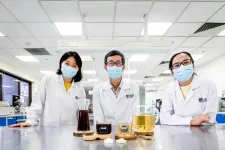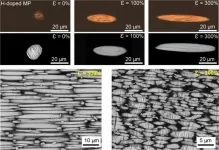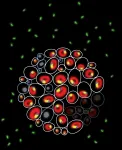NUS researchers concoct probiotic coffee and tea drinks
New fermented coffee and tea contain live probiotics which could improve gut health; these non-dairy and plant-based beverages are suitable for a broader spectrum of consumers
2021-01-11
(Press-News.org) Good news for those who need a cuppa to start the day. Researchers from the National University of Singapore (NUS) have created new probiotic coffee and tea drinks that are packed with gut-friendly live probiotics.
Supervised by Associate Professor Liu Shao Quan from the Department of Food Science and Technology at the NUS Faculty of Science, the two doctoral students who worked on these two new beverages assert that their drinks have a great taste, and can be stored chilled or at room temperature for more than 14 weeks without compromising on their probiotic viability.
Traditional probiotic carriers like yoghurts and cultured milks are dairy-based products. The rise in veganism, along with common health issues like lactose intolerance, high cholesterol, and allergies to dairy proteins, have stimulated the trend in non-dairy probiotic food and beverages.
"Coffee and tea are two of the most popular drinks around the world, and are both plant-based infusions. As such, they act as a perfect vehicle for carrying and delivering probiotics to consumers. Most commercially available probiotic coffee and tea drinks are unfermented. Our team has created a new range of these beverages using the fermentation process as it produces healthy compounds that improve nutrient digestibility while retaining the health benefits associated with coffee and tea," explained Assoc Prof Liu.
A new probiotic tea
To create the new probiotic tea, Ms Wang Rui, a doctoral student from NUS Food Science and Technology, added nutrients into a tea infusion, followed by a careful selection of specific probiotics. The tea mixture is left to ferment for two days, after which it is ready to drink. Any kind of brewed tea can be used in this process, and throughout the fermentation process, the original flavour of the tea is largely retained, with fruity and floral notes introduced.
"The probiotic tea tastes like fruit tea with a little bit acidity, and a similar mouthfeel to the original tea. Drinkers can add sweeteners and milk, or cream, based on their preferences," said Ms Wang.
Many health benefits of tea, such as its antioxidant or anti-inflammatory properties, have been linked to it containing 'polyphenol' molecules. By using the patented fermentation process, the polyphenol contents from the tea are retained, and an additional antibacterial agent - phenyllactate - is produced after fermentation. The drink also contains live probiotics which promote gut health.
A new probiotic coffee
Another doctoral student from the Department, Ms Alcine Chan, created a new probiotic coffee by adding specially selected nutrients to brewed coffee, followed by carefully chosen probiotics. The coffee mixture is left to ferment for a day, and placed in the refrigerator following probiotic fermentation. After this process, the chilled probiotic coffee is ready to drink. Sugar and milk can be added before consumption if desired.
"The formulation is tricky, especially relating to the type and amount of nutrients added, and the probiotic combination. Not every type of probiotic can grow in coffee brews. Adding too few nutrients will not enable probiotic growth while adding too many nutrients will give an unpleasant taste," shared Ms Chan.
Ms Chan concocted several prototypes of the probiotic coffee, and the flavour varies between each one, but all retain the distinctive coffee taste. She explained, "Some of the probiotic coffees give better-balanced acidity, some give better mouthfeels, some have deeper smoky flavours, and some can retain the coffee flavour better after long-term storage."
The caffeine content is retained, so people who consume coffee for caffeine can still get their fix. The probiotic coffee also kept the chlorogenic acid content, which has been linked to a lot of the health benefits of coffee.
Refining recipe and commercialisation plans
Each serving of probiotic tea and probiotic coffee contains at least 1 billion units of live probiotics. This the daily amount recommended by the International Scientific Association for Probiotics and Prebiotics.
Both doctoral students are refining their recipes to enhance the taste and flavour of the two beverages. The NUS team has also filed a patent for the probiotic coffee recipe and hopes to collaborate with industry partners to commercialise the drink.
INFORMATION:
[Attachments] See images for this press release:

ELSE PRESS RELEASES FROM THIS DATE:
2021-01-11
Today's electronic devices strive for new form factors - to make them foldable, stretchable, and deformable. To produce such devices that are highly stretchable or deformable, it is necessary to develop electrodes and circuit lines whose electrical properties can withstand harsh deformation or mechanical damage. To this, POSTECH-Yonsei University joint research team has recently developed liquid metal ink to accelerate printed electronic devices that can be changed into any shape.
Professor Unyong Jeong and Dr. Selvaraj Veerapandian of POSTECH's Department of Materials Science and Engineering, with Professor Aloysius Soon and Dr. Woosun Jang of Yonsei University's Department of Materials Science and Engineering, have developed liquid metal microparticles ...
2021-01-11
NIH-supported pilot study found team-based approach may improve buprenorphine care.
WHAT:
A collaborative approach to treating opioid use disorder that relies heavily on community pharmacists is feasible and may increase adherence and participant satisfaction, according to a pilot study published today in Addiction. The study was supported by the National Institute on Drug Abuse (NIDA), part of the National Institutes of Health, through the NIDA Center for the Clinical Trials Network.
Most people with opioid use disorder who would benefit from medication do not receive it. Buprenorphine is a safe and effective ...
2021-01-11
DALLAS - Jan. 11, 2021 - A set of biomarkers not traditionally associated with cell fate can accurately predict how genetically identical cells behave differently under stress, according to a UT Southwestern study. The findings, published by Cell Reports as a Dec. 1 cover story, could eventually lead to more predictable responses to pharmaceutical treatments.
Groups of the same types of cells exposed to the same stimuli often display different responses. Some of these responses have been linked to slight differences in genetics between individual cells. However, even genetically identical cells can diverge in ...
2021-01-11
As the planet continues to warm, the twin challenges of diminishing water supply and growing energy demand are intensifying. But because water and energy are inextricably linked, as we try to adapt to one challenge - say, by getting more water via desalination or water recycling - we may be worsening the other challenge by choosing energy-intensive processes.
So, in adapting to the consequences of climate change, how can we be sure that we aren't making problems worse?
Now, researchers at the Department of Energy's Lawrence Berkeley National Laboratory (Berkeley Lab), UC Berkeley, and UC Santa Barbara have developed a science-based analytic framework to evaluate such complex connections between water and energy, and options for adaptations in response to an evolving ...
2021-01-11
CORVALLIS, Ore. - Researchers in the Oregon State University College of Engineering have developed a battery anode based on a new nanostructured alloy that could revolutionize the way energy storage devices are designed and manufactured.
The zinc- and manganese-based alloy further opens the door to replacing solvents commonly used in battery electrolytes with something much safer and inexpensive, as well as abundant: seawater.
Findings were published today in Nature Communications.
"The world's energy needs are increasing, but the development of next-generation electrochemical energy storage systems with high energy density and long cycling life ...
2021-01-11
PULLMAN, Wash. - Biomarkers in human sperm have been identified that can indicate a propensity to father children with autism spectrum disorder. These biomarkers are epigenetic, meaning they involve changes to molecular factors that regulate genome activity such as gene expression independent of DNA sequence, and can be passed down to future generations.
In a study published in the journal Clinical Epigenetics on Jan. 7, researchers identified a set of genomic features, called DNA methylation regions, in sperm samples from men who were known to have autistic children. Then in a set of blind tests, the researchers were able to use the presence of these features to determine whether other men had fathered autistic children with 90% ...
2021-01-11
New research shows people who pursue meaningful activities - things they enjoy doing - during lockdown feel more satisfied than those who simply keep themselves busy.
The study, published in PLOS ONE, shows you're better off doing what you love and adapting it to suit social distancing, like swapping your regular morning walk with friends for a zoom exercise session.
Simply increasing your level of activity by doing mindless busywork will leave you unsettled and unsatisfied.
Co-lead researcher Dr Lauren Saling from RMIT University in Melbourne, Australia said while novelty lockdown activities - like baking or painting - have their place, trying to continue what you enjoyed before lockdown can be more rewarding.
"Busyness might be distracting but it won't necessarily be fulfilling," ...
2021-01-11
COVID-19 infections are once again rising at an alarming rate in San Francisco's Latinx community, predominantly among low-income essential workers, according to results of a massive community-based testing blitz conducted before and after the Thanksgiving holiday by Unidos En Salud -- a volunteer-led partnership between the Latino Task Force for COVID-19 (LTF), UC San Francisco , the Chan Zuckerberg Biohub (CZ Biohub), and the San Francisco Department of Public Health (SFDPH).
Unidos En Salud launched their "Healthy Holidays" initiative the weekend before Thanksgiving (Nov. 22-24) in San Francisco's Mission District, where they have been perfecting their community-based surveillance testing ...
2021-01-11
The genetic material of plants, animals and humans is well protected in the nucleus of each cell and stores all the information that forms an organism. For example, information about the size or color of flowers, hair or fur is predefined here. In addition, cells contain small organelles that contain their own genetic material. These include chloroplasts in plants, which play a key role in photosynthesis, and mitochondria, which are found in all living organisms and represent the power plants of every cell. But is the genetic material actually permanently stored within one cell? No! As so far known, the genetic material can migrate from cell to cell and thus even be exchanged between different organisms. Researchers at the Max Planck Institute of Molecular Plant Physiology (MPI-MP) ...
2021-01-11
We are fascinated by machines that can control cars, compose symphonies, or defeat people at chess, Go, or Jeopardy! While more progress is being made all the time in Artificial Intelligence (AI), some scientists and philosophers warn of the dangers of an uncontrollable superintelligent AI. Using theoretical calculations, an international team of researchers, including scientists from the Center for Humans and Machines at the Max Planck Institute for Human Development, shows that it would not be possible to control a superintelligent AI. The study was published in the Journal of Artificial Intelligence Research.
Suppose someone ...
LAST 30 PRESS RELEASES:
[Press-News.org] NUS researchers concoct probiotic coffee and tea drinks
New fermented coffee and tea contain live probiotics which could improve gut health; these non-dairy and plant-based beverages are suitable for a broader spectrum of consumers





